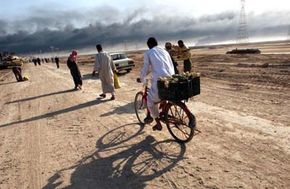Other Reasons to Migrate
War and politics - One could argue that almost every conflict in human history can be traced to population pressure, which means that war and political oppression might just be symptoms of population pressure. It was oppression that drove English Puritans to settle in North America after first fleeing England for Holland. Today, an estimated two million refugees have fled their home country of Iraq as a result of the war, dispersing themselves throughout the Middle East; another two million have been displaced from their homes within Iraq [source: Human Rights Watch].
Economics - In terms of population pressure, money is a stand-in for food. Ever since the Industrial Revolution, few people grow and harvest the food they eat. We purchase it instead. Now, instead of moving to where the food is, people move to where the money is. These migrations can be slow shifts, such as the decline of population in the northeastern U.S. as the steel industry declined. They can also happen quickly. A major new factory built in a town can draw thousands of workers, plus thousands more who will earn money selling food, clothing and entertainment to the workers.
Advertisement
This illustrates the fact that economic migrations don't follow the same patterns as food migrations. Where food is concerned, higher populations make it harder for everyone to get enough food. Conversely, economies thrive on saturated population levels. More people equals more money.
The human spirit -This form of population pressure can't really be measured, but it shouldn't be taken lightly. Humans have an innate desire to explore and colonize new territories. Even when not driven by hunger, politics or economics, humans migrate.
